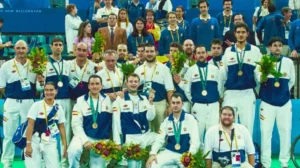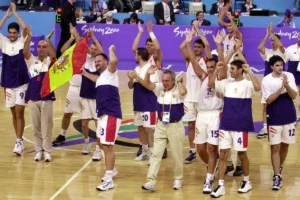Who were the greatest… most egregious… most vile… most talented cheaters in the history of sport? Socrates announces his list of favourites. Number two, but only by a whisker, is the Sydney 2000 Paralympics Spanish Intellectually Disabled Basketball team.

When it comes to singling out the world’s worst cheat one would think that Emperor Nero, discussed in our first instalment of “Greatest Cheats Ever”, would fit into a category all of his own. The smallest of his sins was insisting on being allowed to compete, despite the fact that he was unquestionably Roman and therefore ineligible for participation in the exclusively Greek Olympic Games. Much worse was his insistence that he be allowed to race in the chariot event with ten horses against the other competitors, who were allowed only four. Worse still, was his being awarded the gold medal despite not even winning the race. Ludicrously, he didn’t even finish! He crashed twice!
“Hey… I didn’t know that Jose was intellectually impaired.”
So, for flagrant, ridiculous, hysterical, absurd, and bottom of the barrel levels of cheating one would think that Nero would stand up there on the podium all by himself. One would think. But, no! The reality is that some other cheats, in history, have gone so close to matching the Roman Emperor’s level of dodgy despicableness that one could argue that, in the Olympics of horror cheating, Nero only wins by a short half nose. In this closely contested competition, the Spanish Intellectually Impaired Basketball team of the year 2000 very nearly pips Nero at the post.

Immediately after the Spanish team won the Paralympic Gold Medal for Intellectually Impaired basketballers at the Sydney 2000 Games (and the images of the players excitedly celebrating their huge victory on the court after their medal-winning match began popping up on the front pages of Spanish newspapers), friends, relatives, work colleagues and acquaintances began muttering things like… “hey… I didn’t know that Jose was intellectually disabled.”
Unbelievably good!
Rumours that the Spanish team seemed a bit suss started to proliferate around the games village and more particularly around Spain itself. The fact that this disabled team had managed to beat Portugal by 15 points, Poland by 30 points, Japan by 67 points, Brazil by 56 points and Russia, in the final, by 24 points seemed somewhat extraordinary. How good were these guys? Amazingly good. Unbelievably good! One Australian team official even commented that some of the Spanish players would not look out of place in the Australian national pro league.

The rules for Olympic intellectually impaired basketball were almost identical to that of the able-athlete game rules. Slight adjustments had been made to the size of the court, plus the rule that participating athletes had to test at below an IQ of 70 to be eligible for selection, were the only things that distinguished this competition from the traditional Olympic Games basketball format. Seems pretty straight forward for the organizers. Straight forward… especially since no one thought it necessary to actually check the credentials of the competing athletes. Eligibility was simply left up to the competing countries to ensure that their players were actually intellectually disabled. That makes about as much sense as letting Thommo or Lillee adjudicate on how many bouncers they should be allowed to deliver in a single over.
Oops… there was a professional tattle-tale on the team.
Those rumours about the Spanish team being dodgy soon died down. The amazing performance of the Spaniards would have stayed on the Olympic record books for all time if it hadn’t turned out that the Spanish officials’ checking of the backgrounds of its team’s players was just as dodgy as was its checking of the disabled status of the players. One of the star players on the squad just happened to be an investigative journalist. You would think that if you were planning to pull off a scam like the rigging of an Olympic Games tournament you would make sure that the scammers you employed were not highly skilled professional tattle-tales.
Soon after the return of the team to Spain, Carlos Ribagorda published his “Fraud at the Olympics” story in the Spanish business magazine Capital. In his article he claimed that no more than two members of the team of twelve were actually intellectually impaired. He also stated that the Spanish officials pulled the horrendous stunt because they needed to win medals to guarantee their on-going sponsorship and funding. He also pointed the finger at athletes participating in other sports at the Games as dodgy.

Of course, the Spanish team were forced to return their gold medals and the head of the Spanish intellectually impaired sporting association was shamed into resigning. But much damage was done to the reputation of the Games. So much so that Paralympic Games officials decided to not hold any more intellectually impaired tournaments at the Games for many years! They thought that it was just a bit too hard.
Legitimate athletes banned!
Effectively, the ones who were punished most severely for the actions of the cheating Spanish team and the inadequate administration of the Games were the honest athletes. Many genuinely intellectually impaired athletes felt that their own performances were under question and suffered anxiety and depression as a result of the scandal. Sadly, the fallout from the scandal also meant that legitimate athletes were not allowed to compete again at the Olympic level until 2012.
Think about it. Who is worse? A psychopathic megalomaniac who would cheat, bribe, and threaten his way to a declared victory in a contest that he didn’t even complete or a bunch of ratbags who were willing to participate in a scam that prevented dozens of disabled athletes from having a chance to win a medal that they had worked years towards? Tough call? Much as the reprehensibility of the Spanish team is hard to fathom I still think that, for sheer hilarious bravado, Nero still wins the medal by a whisker.

Leave a Reply